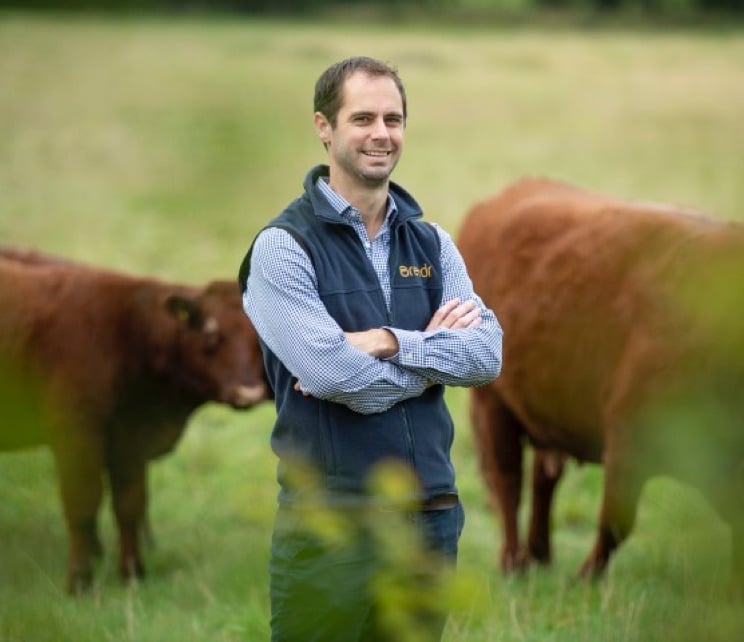Farmers’ chance to invest in future of livestock production

British farmers are being given the chance to invest in the future of livestock production, diversifying their own income streams while accelerating the drive to sustainable supply chains.
Breedr, the free herd management app which is transforming the beef sector, is opening up to farmer investors through a new crowdfunding campaign, offering traditional shares in a ground-breaking company.
“Since launching in 2019, we have grown rapidly and delivered significant improvements to the British beef sector,” explains founder Ian Wheal. “We have more than 1,000 active farmers with 160,000 cattle registered on the platform. Nearly 4,500 animals – worth £3m – have been sold through the Breedr marketplace since January 2021, with 96% of listings achieving their asking price within four days.
“And in March we launched the world’s first long-term, minimum fixed beef contract, offering farmers confidence in investing for the future and the ability to borrow against their stock.”
Sarah Haire from Dunbia explains: “The thing that really interested us was Breedr’s ability to predict growth rates throughout the supply chain and then ultimately predict when cattle are coming into us. That makes our planning and logistics much simpler and then ultimately much more efficient.”
The company has raised £5.2m in funding to date through two large venture capitalist firms, and is now offering shares to farmer investors who are keen to secure a profitable, sustainable and low carbon future for the sector.
“Using our growth predictor graph, farmers can see which animals are performing well, and finish them at the optimum time,” explains Mr Wheal. “This means they are finishing animals more quickly, in-spec, and with two tonnes less food than average. That’s a saving of more than 800kg of carbon per animal.”
Breedr’s KPI benchmarking tool enables producers to identify the most productive genetic lines, ensuring rapid and long-term improvements to their stock – whether that’s breeding their own replacements or buying in from hand-picked calf or store suppliers.
“Our farmers are producing beef with 28% less carbon footprint than the industry average, and we are now working to roll out more sustainable, data-driven supply chains,” says Mr Wheal. “The opportunities available to farmers by taking better control of the supply chain and their data are tremendous. We want our producers to be part of building a profitable and resilient future.”
Panel – Farmer investors
Lorna Townsend keeps 25 Limousin cross suckler cows near Tunbridge Wells, Kent, and having used the app for over a year is keen to invest in its future development. “It’s a great tool; really informative and easy to use. I have all the information on my animals at my fingertips, and in future I’d like to see my costings for each animal from start to finish,” she says.
“The fact it’s run by farmers for farmers is important to me; we’ve offered to do anything we can to help it develop. We’ve recommended it to all of our friends and the Breedr community is really strong too. It not a replacement for auction markets but it’s saving us all time and money.”
Jonathan Chapman keeps 550 pedigree Aberdeen Angus suckler cows at Hele Barton, Bude, Cornwall, and uses Breedr to record all of his livestock data including weights, genetics, and medicine use. “There’s a lot of data that we as farmers are recording that’s under-used: We want to make the most of that. Looking at what’s happening with data in other industries I can see the potential for Breedr to make our lives easier and more profitable,” he says.
Having established his own start-up business focussing on measuring and improving beef eating quality, Mr Chapman can see the financial benefits of investing in the company. “There’s very little competition, and potential to develop several different revenue streams: The industry is ripe for this to come along.”
· To find out more or to take part in the CrowdCube fundraising campaign, visit www.breedr.co or call 01243 210286. Interested parties can invest upwards of £10 and receive shares in the same way as publicly listed companies.




